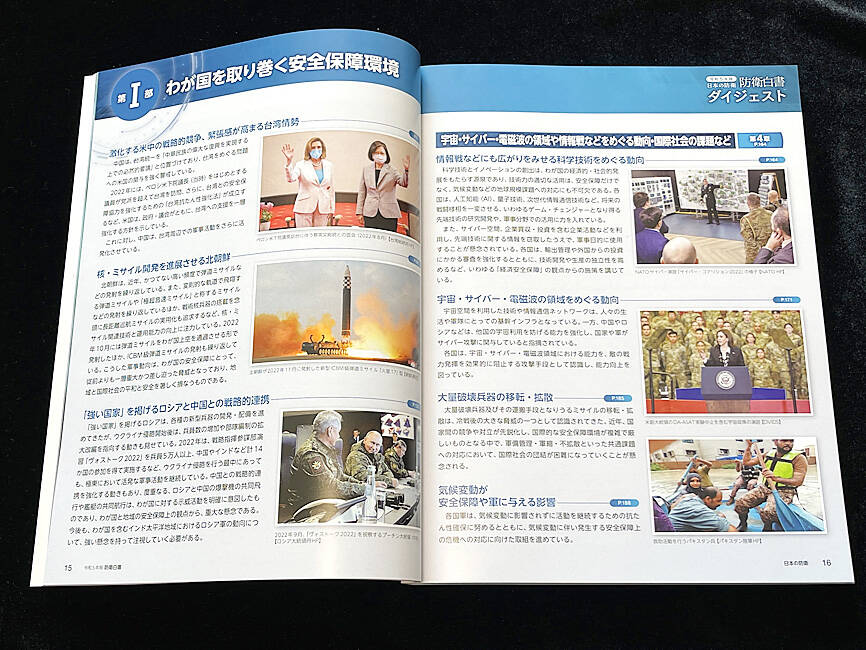Stressing the importance of peace and stability in the Taiwan Strait, Japan yesterday described China as the greatest strategic challenge to the nation and the world.
Japan is facing the most severe and complex security environment since the end of World War II, the latest Defense of Japan white paper said, citing military threats posed by Russia, North Korea and China as major sources.
The white paper, which was approved in a Cabinet meeting and released yesterday, was based on the National Security Strategy, the National Defense Strategy and the Defense Buildup Program that were adopted by the Japanese government in December last year.

Photo: CNA
Japan should cooperate with its allies in deterring and responding to unilateral changes to the “status quo” by force, as well as shaping a secure environment that does not tolerate such attempts, it said.
China has not ruled out uniting with Taiwan by force and has intensified military actions around Taiwan, it said.
Beijing’s behavior was partly in response to the US’ involvement in issues concerning Taiwan, such as then-US House of Representatives speaker Nancy Pelosi’s visit to the nation last year and the US Congress’ passage of the Taiwan Enhanced Resilience Act and other legislation in support of Taipei, the report said.
Comparing the military capabilities of China and Taiwan, including defense budget, army, navy and air force, and military equipment, it said that “the military balance of China and Taiwan as a whole is rapidly tilting in a direction favorable to China,” the report said.
Japan strongly urged China to refrain from attempting to unilaterally change the “status quo” in the East and South China seas, it said, adding that peace and stability in the Taiwan Strait are extremely important not only for Tokyo, but also for the international community.
In other developments, Japan reiterated its support for Taiwan’s inclusion in the Comprehensive and Progressive Agreement for Trans-Pacific Partnership (CPTPP) at the “two plus two” talks between Taiwan’s and Japan’s ruling parties on Thursday.
The dialogue between the two ruling parties was launched in August 2021 and was held in Japan for the first time, which was attended by Democratic Progressive Party legislators Lo Chih-cheng (羅致政) and Kuo Kuo-wen (郭國文) and the Japanese Liberal Democratic Party’s (LDP) foreign affairs division director Iwao Horii and national defense division director Konosuke Kokuba.
The two sides exchanged opinions on the situation in East Asia, economic security issues and Taiwan-Japan relations.
The Japanese representatives reaffirmed Tokyo support for Taiwan’s bid to join the CPTPP, as well as other international organizations, adding that they would help communicate with other members of the group.
With the next meeting scheduled to be held in Taipei, Kuo said that he hoped the dialogue could be a continual, normal exchange between the two sides.
Additional reporting by Lin Tsuei-yi

AIR SUPPORT: The Ministry of National Defense thanked the US for the delivery, adding that it was an indicator of the White House’s commitment to the Taiwan Relations Act Deputy Minister of National Defense Po Horng-huei (柏鴻輝) and Representative to the US Alexander Yui on Friday attended a delivery ceremony for the first of Taiwan’s long-awaited 66 F-16C/D Block 70 jets at a Lockheed Martin Corp factory in Greenville, South Carolina. “We are so proud to be the global home of the F-16 and to support Taiwan’s air defense capabilities,” US Representative William Timmons wrote on X, alongside a photograph of Taiwanese and US officials at the event. The F-16C/D Block 70 jets Taiwan ordered have the same capabilities as aircraft that had been upgraded to F-16Vs. The batch of Lockheed Martin

GRIDLOCK: The National Fire Agency’s Special Search and Rescue team is on standby to travel to the countries to help out with the rescue effort A powerful earthquake rocked Myanmar and neighboring Thailand yesterday, killing at least three people in Bangkok and burying dozens when a high-rise building under construction collapsed. Footage shared on social media from Myanmar’s second-largest city showed widespread destruction, raising fears that many were trapped under the rubble or killed. The magnitude 7.7 earthquake, with an epicenter near Mandalay in Myanmar, struck at midday and was followed by a strong magnitude 6.4 aftershock. The extent of death, injury and destruction — especially in Myanmar, which is embroiled in a civil war and where information is tightly controlled at the best of times —

Taiwan was ranked the fourth-safest country in the world with a score of 82.9, trailing only Andorra, the United Arab Emirates and Qatar in Numbeo’s Safety Index by Country report. Taiwan’s score improved by 0.1 points compared with last year’s mid-year report, which had Taiwan fourth with a score of 82.8. However, both scores were lower than in last year’s first review, when Taiwan scored 83.3, and are a long way from when Taiwan was named the second-safest country in the world in 2021, scoring 84.8. Taiwan ranked higher than Singapore in ninth with a score of 77.4 and Japan in 10th with

SECURITY RISK: If there is a conflict between China and Taiwan, ‘there would likely be significant consequences to global economic and security interests,’ it said China remains the top military and cyber threat to the US and continues to make progress on capabilities to seize Taiwan, a report by US intelligence agencies said on Tuesday. The report provides an overview of the “collective insights” of top US intelligence agencies about the security threats to the US posed by foreign nations and criminal organizations. In its Annual Threat Assessment, the agencies divided threats facing the US into two broad categories, “nonstate transnational criminals and terrorists” and “major state actors,” with China, Russia, Iran and North Korea named. Of those countries, “China presents the most comprehensive and robust military threat